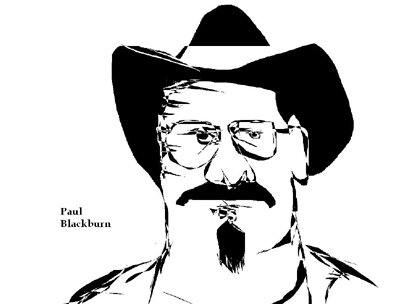
|
Excerpt from
Pancho Villa or The Fate
In Spain one drinks from
both cups.
Split a diamond /
quarter it / cut it in eighths
the glamour of increasing surfaces.
And in getting below them
one partakes of aspects
like wounds
Interview in New York Quarterly
NYQ: What poets have influenced your work?
PAUL BLACKBURN: W. H. Auden was an early influence. My mother
sent me a copy of his Collected Poems when I was in the Army. When I was
nineteen, I could write a pretty good Auden poem, and I feel that I picked up a
formal sense of musical structure from him. In college I began to read Ezra
Pound. His Personae, not to mention the Cantos, was an incredible revelation to
me as to what you could do in terms of making music with different line lengths,
and how, rhythm could be so rich and varied. I think I learned a lot of my ear
from reading Pound. At the same time I was studying Pound, I was picking up
influences from my contemporariesóRobert Creeley, Charles Olson and Cid Corman.
I was learning to strip my style of as much as I could and get down to very
simple statements while still keeping it reasonably musical. I think a lot of
the William Carlos Williams influence came to me, not through Williams so much,
as through Williams' influence on Creeley. In a review of my first book, the
critic blamed both Creeley and me on Williams. I thought, "Oh, wow! I've got to
read Williams!" So I got ahold of Paterson, and what was then his Collected
Poems. I wanted to find out where my influences were coming from. I wanted to
find out who my father was.
Robert Creeley on Blackburn
I'd
like to speak personally of this extraordinary poet, and take that license
insofar as these poems are personal, often bitterly so. I wonder if any of us
have escaped the painful, self-pitying and meager defenses of person so many of
them invoke. What we had hoped might be, even in inept manner worked to
accomplish, has come to nothing - and whose fault is that, we ask. Certainly not
mine? Having known both of these dear people, and myself, I have to feel that
there will never be a human answer, never one human enough.
|
